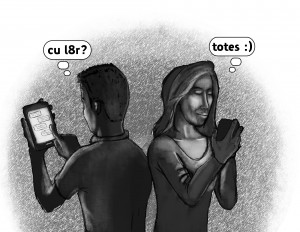
It was during the summer when David Hill came to terms with the power of social media.
The 20-year-old media and film student studying at DBS, felt it was almost compulsory for a young adult to be engrossed in all aspects of social media. Although the medium has its advantages, it may also be blurring or totally destroying personal communication.
“My personal use of Twitter was intentionally for my opinions on issues or controversial topics on television,” he says. “Social media is perfect for communicating with friends or family from abroad when I can’t physically meet in person,” he says.
Although David prefers to meet person to person, he has fallen into the trap of using social media as a mode of personal communication via Facebook, Twitter or texting.
“I think Social media is an easier way to meet new people given its accessibility. For example, on Twitter if you hash tag on a certain issue, you automatically interact with people who share the same interest,” says David.
Although social media may make it easier to communicate with people, it does limit interpersonal communication skills according to Professor Frank Bannister a Senior Lecturer at the School of Computer Science and Statistics at Trinity College Dublin.
“My sense is that it is damaging interpersonal personal communication skills in a number of ways. Communication via social media (and e-mail) tends to be briefer, less verbally rich and of course does not include all the body language and signals that we use when talking face to face,” says Bannister. As a result, teenagers and young adults may be losing some key social skills that could hamper their efforts to communicate in a group or team.
Other academics tend to agree with this theory. Shirley Turkle, a psychologist and director of the MIT Initiative on Technology and Self, and author of the book Alone Together points out that some ‘twenty somethings’ would rather text than hold a verbal conversation. In a 2009 interview with American documentary program ‘Frontline’ Turkle said twenty somethings have the “illusion of companionship without the demands of friendship” when immersed in the social world. They may use social media to “skip and cut corners” when it comes to forming a real person-to-person relationship she added.
This method is done in a variety of ways. On Twitter, sentence structures are eradicated to fit words into a 140 character limit. On Facebook, communication can occur through page conversations or IM (instant messages). On YouTube, video channels are created without the need for any personal communication with the people who own those videos. On other social media forums such as Instagram and Tumblr, users can share photos and videos and add comments, further breaking any need for a phone call or a face-to-face meeting.
“I worry about the impact that this form of communication has on people’s ability to develop the kind of deep thinking and reasoning needed for dealing with the problems we face today. Language is closely connected to thought. I am also concerned about its impact on young people’s ability to concentrate for long periods,” says Bannister.
David doesn’t see it quite as bad. He asserts on a number of occasions that he is not “addicted” to the new social media world. Instead he has immersed himself in it, which can have its advantages such as helping with college work or getting the latest concert tickets.
By: Liam Cahill



